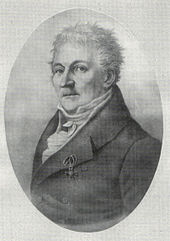Wilhelm Josephi
Johann Wilhelm Josephi (born March 8, 1763 in Braunschweig , † August 31, 1845 in Hohen Sprenz ) was a German surgeon and obstetrician. He taught at the University of Rostock .
Life
Wilhelm Josephi was born the son of a surgeon, his mother also came from a medical family. Josephi showed an early interest in medicine and was already present at his father's operations as a high school student. From 1782 he studied medicine in Göttingen . He was still a student in 1784 a position as " Prosektor with content" and was in 1785 in Helmstedt Dr. med. PhD. He taught as a private lecturer at the Göttingen Theatrum anatomicum and undertook a scientific journey through Germany, before settling as a general practitioner and obstetrician in 1788, initially in Braunschweig and later in Peine near Hildesheim . In 1789 he was appointed associate professor and prosector at the University of Rostock. He was appointed full professor of anatomy, surgery and obstetrics in 1792.
On September 27, 1789, shortly before he left for Rostock, Josephi married Johanne Christiane Dorothea, née Sievers. The couple had seven children.
At this point in time, the university was in a bad state, since from 1760 to 1789 a dispute and separation of the University of Rostock culminated in the establishment of the University of Bützow and the return to Rostock had just taken place. The small number of students and the associated poor pay forced Josephi to work as a doctor and obstetrician in the Rostock hospitals. The activity as regimental doctor since 1805 certainly had similar reasons.
In 1790 Josephi opened the first anatomical institute in Rostock on the Alter Markt . In 1793 he took over the management of the midwifery school and published a midwifery textbook in 1797. In 1801 he opened a surgical clinical institution, in which he performed operations with students free of charge. Since he had to contribute almost all of the funds from his private assets, he was only able to operate this institution for three years, which resulted in an immediate decrease in the number of students from over 20 to one.
In 1805 he was elected rector of the university. In 1805 he published a paper entitled “Fragments of a physical-medical description of Rostock”, in which he denounced the poor living conditions and the inadequate hygienic conditions in the city. Also in 1805 Josephi bought the previous regimental surgeon his position in the Infantry Regiment Hereditary Prince (Rostock garrison) . On July 7, 1808, Josephi was appointed surgeon general of newly established battalions by Duke Friedrich Franz I , and later surgeon general of the army. In his textbook on war medicine, which he completed in 1808 and which appeared in 1813 as the instruction to maintain the health of soldiers in the field , Josephi developed a number of then progressive ideas for medical care for the troops. Josephi's humanistic stance was also evident in his desire for treatment of wounded opponents and the definition of medical staff as neutral. Josephi did not remain surgeon general in the army - the main reason for this decision was probably his non-participation in the war of liberation against Napoleon and thus the lack of personal commitment - but he continued his reformatory work. In particular, he advocated improvements in the field of military hygiene. In 1816 he was re-elected rector of Rostock University.
On August 28, 1839, on the occasion of his 50th anniversary as a professor, Grand Duke Paul Friedrich appointed Johann Wilhelm Josephi a secret medical advisor.
Josephi died in Hohen Sprenz, where one of his daughters lived as a pastor's wife, and found his final resting place in a family chapel in Rostock.
Works (selection)
- De conceptione abdominali vulgo sic dicta. (= Dissertation, University of Göttingen) Dieterich, Göttingen 1784, OCLC 14852741 .
- About animal magnetism as a contribution to the history of human aberrations: together with an illumination of the Comte de Satillieu. School bookshop, Braunschweig 1788, OCLC 257642520 .
- Outline of the natural history of man. In addition to a preliminary overview of general natural history for the use of the lectures. Hoffmann, Hamburg 1790, OCLC 230983054 .
- About the pregnancy outside the uterus and about a very strange bladder pregnancy in particular. Stiller, Rostock 1803, OCLC 14842101 .
literature
- August Hirsch: Josephi, Wilhelm . In: Allgemeine Deutsche Biographie (ADB). Volume 14, Duncker & Humblot, Leipzig 1881, p. 569 f.
- Willi Passig: City of my life - 22 Rostock images of life. Redieck & Schade, Rostock 2008, ISBN 978-3-934116-69-6 .
- Klaus-Ulrich Keubke, Ralf Mumm: Soldiers from Mecklenburg. Pictures of life from 1701 to 1871. Keubke, Schwerin 2004, ISBN 3-00-014908-2 .
Web links
- Literature about Wilhelm Josephi in the state bibliography MV
- Literature by and about Wilhelm Josephi in the bibliographic database WorldCat
- Entry on Wilhelm Josephi in the Catalogus Professorum Rostochiensium
Individual evidence
- ↑ Place of death not: Rostock , as it is often stated in the literature. (See death entry in the Hohen Sprenz church register)
| personal data | |
|---|---|
| SURNAME | Josephi, Wilhelm |
| ALTERNATIVE NAMES | Josephi, Johann Wilhelm (full name) |
| BRIEF DESCRIPTION | German surgeon and obstetrician |
| DATE OF BIRTH | March 8, 1763 |
| PLACE OF BIRTH | Braunschweig |
| DATE OF DEATH | August 31, 1845 |
| Place of death | Hohen Sprenz |
